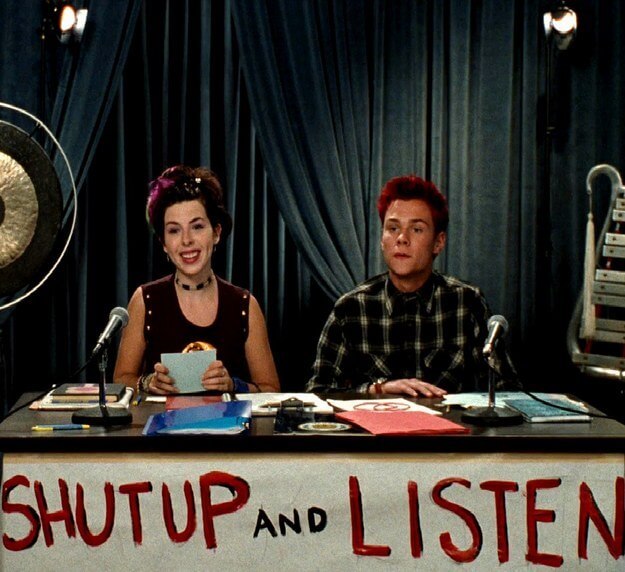If you aren’t personally terrified of public speaking, you probably know someone who is. Unfortunately, unlike sharks, clowns and other phobias, public speaking is hard to avoid. Certain fears must be faced, but I have a little secret: You got this. Follow these tips and you can kiss those pre-presentation jitters goodbye.
1. Tense, then release

If your fear is really bad, you might literally shake before going up in front of the class. “If you find yourself getting shaky or jittery, release nervous energy in your hands and legs by tensing up, and then releasing—like a squeeze action,” Jessica Lu, instructor of record at University of Maryland’s Department of Communication, said. Maybe curl your toes super hard and then gently relax them (it’s probably better if the body part you’re tensing isn’t super visible).
2. Practice, practice, practice

How else do you get to Carnegie Hall? OK, lame dad jokes aside, practice is probably the most important thing you can do to succeed at public speaking. “Every chance you get, whether it’s at a meeting or during class, put yourself out there and speak in front of others,” Lu said. It seems weird, but the more you do the thing you’re afraid of, the less it will scare you. Also, before your speech, practice a bunch of times. I don’t mean practice reading a speech over and over—practice talking about your ideas in front of friends or roommates.
3. Speak slowly
OK, you’re terrified, and that makes you nervous, so when you do get the nerve to speak, it’s a blurry, speedy, monotone fact-dump. Fight the urge to do this with all of your power. Take a deep breath and pace yourself. Your courage means nothing if no one can understand what you’re saying. You prepared something awesome and people deserve to hear it. “I used to get nervous, and it helped to write short words of encouragement on my notecards,” University of Maryland junior Molly Chinoy said. Try writing “slow down” on your note cards, if you’re using them; this will remind you to check your pace intermittently.
4. Don’t read directly off the notecards

We’ve all been in a class where a person gets up to talk, stares at his notecards, and just reads off them the entire time, completely avoiding eye contact. This isn’t public speaking, but rather public reading. The best way to use notecards is to write prompts that go along with the general outline of your speech so you won’t lose your train of thought. “Never write word-for-word what you’re going to say–it’s important to force yourself to be comfortable with what you’re going to say ahead of time,” Chinoy said.
5. Don’t scan and pan

I’m sure you’ve heard this dumb advice: “Look at eye level and scan across the room–it looks like you’re making eye contact, but you don’t actually have to!” First of all, it does not look like you’re making eye contact, it looks like you’re scanning the room like a weird robot. As you speak, make specific, relaxed eye contact with each audience member, one by one. You don’t have to look at one person the entire time and freak them out; just spend two to three seconds looking at each person. Your audience is comprised of people who want you to succeed. “Just think about whenever you’ve been in the audience of someone else’s speech. You’re never rooting for them to fail; all your audience wants is for you to succeed,” University of Maryland junior Luis von Horoch said. You’re talking to your audience, so look at them, not at the back of the room or your feet. Your speech is not for your feet.
6. Know what you’re talking about

Public speaking isn’t about memorizing an entire speech verbatim. Just know the information and the general order of what you’re going to say; the rest will flow naturally. “Try to prepare multiple examples, anecdotes, analogies, and/or metaphors to explain concepts and ideas; you’ll never know when you’ll need to adapt to different audiences or answer questions,” Lu said. Knowing what you’re talking about rather than just memorizing your speech will make you feel more confident.
7. Bring water

“When all else fails, you can offer a polite ‘excuse me’ and take a drink of water—giving yourself a chance to get back on track, if you find yourself in a bind,” Lu said. Not only is water a great excuse to take a quick pause, it’ll also keep you hydrated and make your voice sound smooth. Be sure to drink lots of water in the hours leading up to your speech so your voice doesn’t crack or sound too raspy.
8. Dress for success

Beauty is only skin deep, but the better you look, the better you feel. Studies show that people who show up to tests dressed well tend to score better than those who wear sweatpants and casual clothing. Don’t put on a tuxedo or a ball gown, but wear something that makes you feel confident. “I also always make sure to wear comfortable shoes–not sneakers necessarily, just a pair of shoes that doesn’t hurt my feet. If you’re going to be standing for a while, you don’t want to be distracted by foot pain,” von Horoch said. Being nervous about speaking is one thing, but being nervous about speaking and feeling self-conscious about your outfit? That’s the worst.



















